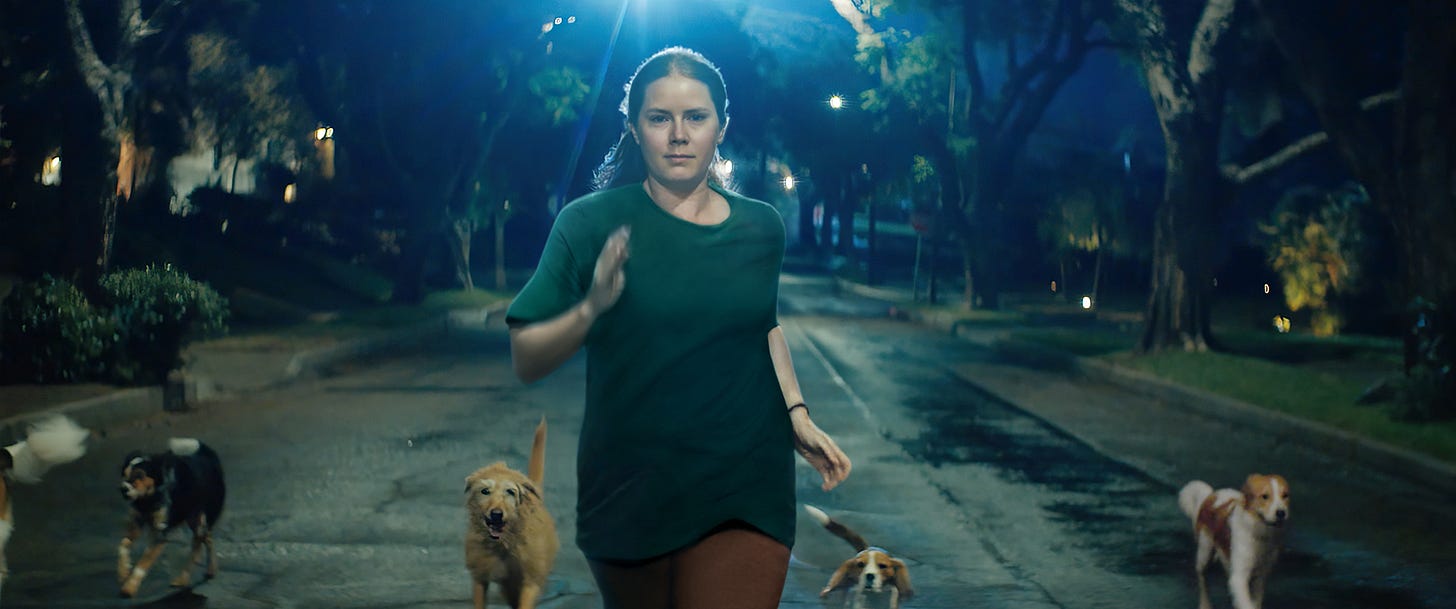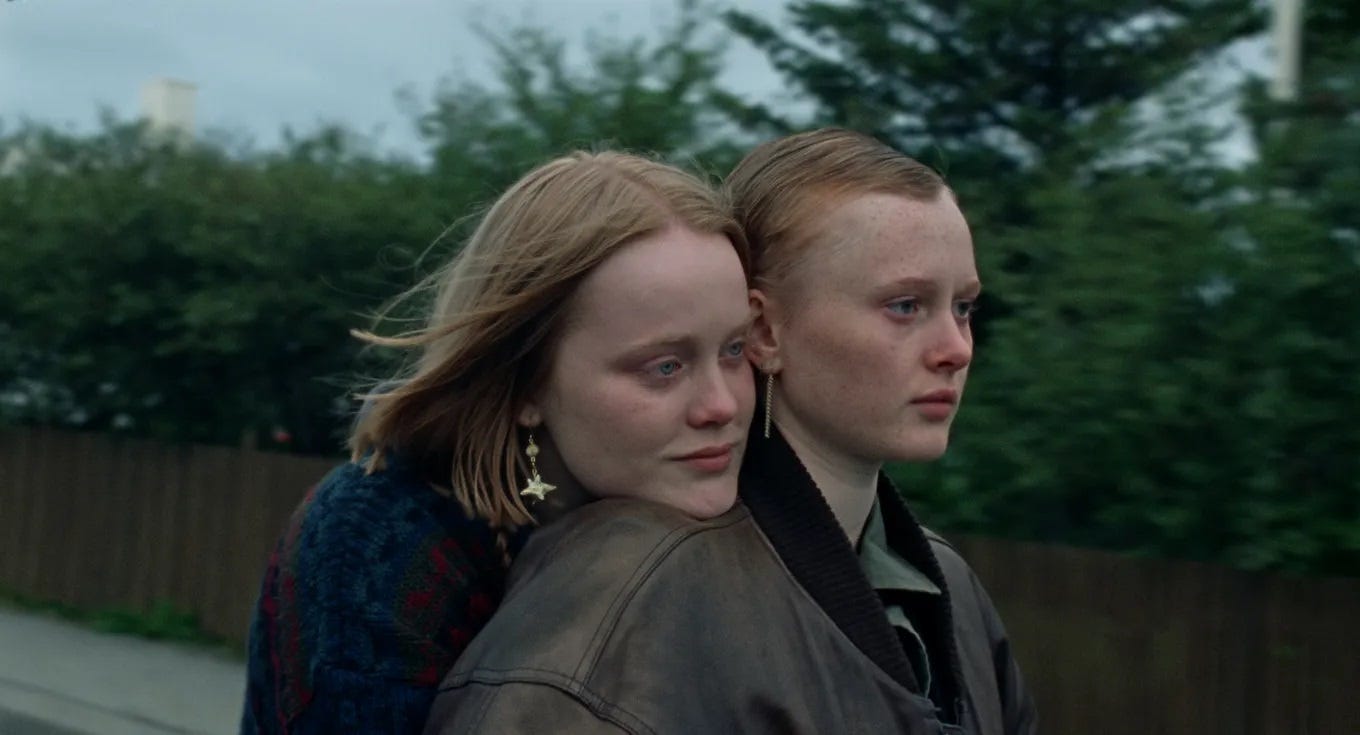CIFF 2024 In Review: Nightbitch, When the Light Breaks
Two wildly different films about chaotic change, memorable for their central performances and little else.
With the 60th Chicago International Film Festival in full swing, DoomRocket is here to highlight its choicest selections. In review: Marielle Heller’s Nightbitch and Rúnar Rúnarsson’s When the Light Breaks.
NIGHTBITCH [United States]
It seems the recurring idea this movie season is that we're all unhappy with ourselves. Imagine that! Coralie Fargeat's The Substance took this ennui to its greatest extreme, with Demi Moore enduring physical catastrophe just to put the concept of Margaret Qualley out into the world, and Aaron Schimberg's A Different Man explored how changing one's appearance doesn't change our interior selves. Marielle Heller's Nightbitch, which stars Amy Adams as a disenchanted housewife who undergoes a spiritual change of lycanthropic proportion, stalks similar ground. If this trend continues, therapists should start handing out brochures in the theatre lobby.
As a film that underscores (and then underscores again) the importance of self-worth, Nightbitch is the slightest of these films and also possibly the most didactic, but it's also not without its flourishes of rude humor concerning aging's many stigmas. Based on Rachel Yoder's novel, Heller's film spends much of its time accounting for the loss of self in the face of traditional expectations — in the case of Adams' unnamed character, that means becoming a mother, which, after being subject to all the indignities that come with raising a toddler, has sapped her sense of pride and accomplishment. Her life takes a turn when, amid life's many messes and disappointments, she manifests a thick patch of fur on her back. With this alarming development comes superhuman smell and a series of nipples growing where they probably shouldn't. Also, a pack of dogs are congregating outside her home every night.
So, what the hell is happening here? I think it's best to interpret these transformations as shaggy dog shorthand for the gauntlet of self-actualization. Heller hints at an inherited supernatural aspect (witchcraft? Maybe!), though she's careful not to tether her film's cozy message of positive personal change to any frivolous fantastical elements. And even though this decision blunts the film's "Amy Adams turns into a dog" body horror hook (it manifests in her character's artwork, but the matter is otherwise politely shelved before the end), it's still fun, with Adams committing to all this unflattering chaos in frequently surprising ways. If Nightbitch has any staying power, it doesn't come from Heller's charmingly inoffensive resolution but from the magnetic charge emanating from Adams's hungry, ferocious performance.
6 / 10
Nightbitch premieres at the 60th Chicago International Film Festival on Monday, October 21 at the Music Box Theatre. It’s slated for a theatrical run beginning on December 6.
Written and directed by Marielle Heller.
Cinematography by Brandon Trost.
Starring Amy Adams, Scoot McNairy, and Jessica Harper.
Produced by Anne Carey, Marielle Heller, Sue Naegle, Christina Oh, Amy Adams, and Stacy O'Neil.
Rated R for the odd spilling of bodily fluids and a bit of lusty thrusting.
WHEN THE LIGHT BREAKS [Iceland, The Netherlands, Croatia, France; U.S. Premiere]
Rúnar Rúnarsson's When the Light Breaks is a lovely film to look at, boosted immeasurably by a visually impactful bookending motif that underscores sudden loss and the sorrow that follows. (Punctuated in no small part by Johann Johannsson's "Odi et Amo," just about the saddest piece of electronic music you're ever like to hear.) That motif is concerned with movement, the way it halts abruptly or continues into infinity, with Rúnarsson pushing his camera through abstract darkness to reveal either catastrophe or the overwhelming beauty of a sunset over the sea.
Like I say, it's lovely to think about, and When the Light Breaks gives us plenty of space to gnaw on the themes the film traffics in during its many quiet stretches of ruminative grief. It follows Una (Elín Hall), an art student who, at least up until the events of the day in which nearly her entire story is set, had been secretly involved with another student named Diddi (Baldur Einarsson), who shared a long-distance relationship with Klara (Katla Njálsdóttir). Una wakes up in Diddi's flat, sneaks out to avoid his roommate (Mikael Kaaber), loses her boots in the attempt, and runs off to her interpretive performance class. It's there where she discovers that Diddi has died in a horrific highway collision.
What follows are sequences in which Hall, a striking presence of tightly coiled nerves and repressed fury, minimizes the nature of her character's doomed relationship in front of Diddi's friends and especially Klara, who comes to town to join their mournful celebration of his life. It's a challenging role to pull off even at a fleeting 82 minutes, but Hall acquits herself marvelously by conveying and sustaining all the tremulous emotions that threaten to explode from Una at any moment (anger, jealousy, guilt, despair, sometimes all at once). A lesser performance would draw attention to how exhausting much of the film can be; instead, Hall makes it compelling, even devastating.
As an understated exercise in tragedy, trauma, and the full spectrum of feelings that unspool from both, When the Light Breaks is frustratingly elusive when it comes to catharsis and resolution, especially after spending so much time watching these kids with their peculiar hairdos pound shots of Stoli and weep into each other's designer jackets. That may be the point: life is chaos and emotions can be incomprehensible. But while those sentiments feel genuine, Rúnarsson wants us to think they're profound — problem is, this rumination on overwhelming loss and the strange bedfellows it creates is in service of not much else but harnessing a vibe.
6 / 10
When the Light Breaks premieres at the 60th Chicago International Film Festival on Monday, October 21 at AMC NEWCITY 14.
Written and directed by Rúnar Rúnarsson.
Cinematography by Sophia Olsson.
Starring Elín Hall, Mikael Kaaber, Katla Njálsdóttir, Gunnar Hrafn Kristjánsson, and Baldur Einarsson.
Produced by Heather Millard and Rúnar Rúnarsson.
Unrated. Much boozing, vaping, and sobbing.
Our CIFF 2024 coverage continues later this week.




